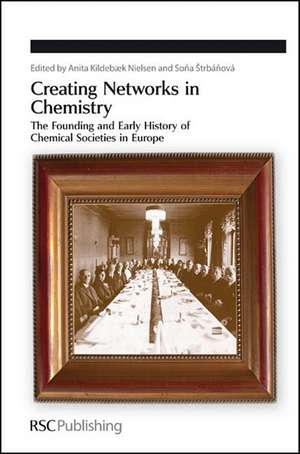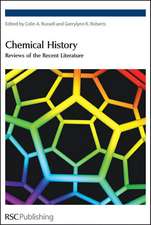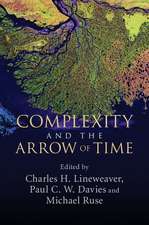Creating Networks in Chemistry: The Founding and Early History of Chemical Societies in Europe: Special Publication / Royal Society of Chemistry, cartea 316
Editat de Anita Kildebaek Nielsen, Sona Strbanovaen Limba Engleză Hardback – 31 mar 2008
During the second half of the nineteenth century and the beginning of the twentieth century chemical societies were established all over Europe. The book focuses on this process and further development of the European chemical societies before World War I and in exceptional cases up to 1930. It comprises chapters based on a common set of questions and an extensive concluding chapter that provides a comparative analysis of the early development of the European chemical societies. The book offers unique historical material showing the social, intellectual and political circumstances in which the chemical societies were constituted and function, their relations to universities and chemical industries, everyday lives, international contacts, etc. The analysis of data explores how networks in chemistry and professional autonomy were constituted, and investigates the process of demarcation that inevitably takes place when a social institution of a scientific discipline is formed. The reader gets answer to the important question of what chemistry was and was not in the latter half of nineteenth century and the first decades of the twentieth century. Various aspects of creating scientific societies have been of much interest to historians of science in recent years. Nevertheless, histories of scientific societies are mostly occasional publications written to celebrate their jubilees. This volume represents a first international comparative analysis on the beginnings of chemical societies in Europe based on a detailed historical research done by a group of renowned historians of chemistry from several countries. As such it is an entirely new contribution to the history of chemistry in Europe and European scientific societies in general and a unique source for chemists and historians. Its ambition is to become a reference work in history of chemistry, set the standard for similar studies in other disciplines, and serve European chemical societies to provide a context for their complex histories and relationships. The book can be read by miscellaneous audiences and various types of readers with diverse intentions who will benefit differently from it: - A member of a national chemical society will find there narrative on his "own" society's establishment and early history and the opportunity to compare it with societies from other countries - Historically interested chemists will find in the book details as well as wider perspectives on the institutional history of their discipline - Historians of chemistry will get a thoroughly documented and scholarly book on the early history of chemical societies in Europe, written by acknowledged colleagues. The individual chapters will offer additional literature and sources for their research into history of chemistry. - Historians of science will get material for comparative studies on scientific institutions on the roles of learned societies on national and international level. They can be inspired to create similar studies related to other scientific disciplines. The underlying common set of guidelines can provide methodological assistance. - Teachers of history of chemistry and history of science will find in the book additional reading material and literature. - Social and general historians will be given a well-edited and reliable source on a number of social institutions that played versatile roles in local/national settings. The establishment of chemical societies can be compared with other kinds of learned, professional, and amateur societies in the same period. They also will get data and information about some aspects of the scientific boom in the second half of the nineteenth century and pre-WW1 period.
Preț: 789.43 lei
Preț vechi: 917.94 lei
-14% Nou
Puncte Express: 1184
Preț estimativ în valută:
151.05€ • 157.71$ • 125.02£
151.05€ • 157.71$ • 125.02£
Carte tipărită la comandă
Livrare economică 05-19 aprilie
Preluare comenzi: 021 569.72.76
Specificații
ISBN-13: 9780854042791
ISBN-10: 0854042792
Pagini: 404
Ilustrații: 1
Dimensiuni: 157 x 234 x 30 mm
Greutate: 0.82 kg
Editura: Royal Society Of Chemistry
Seria Special Publication / Royal Society of Chemistry
ISBN-10: 0854042792
Pagini: 404
Ilustrații: 1
Dimensiuni: 157 x 234 x 30 mm
Greutate: 0.82 kg
Editura: Royal Society Of Chemistry
Seria Special Publication / Royal Society of Chemistry
Cuprins
Chapter 1: AUSTRIA Austrian Chemical Societies in the Last Decades of the Habsburg Monarchy until 1914; Chapter 2: BELGIUM From Industry to Academia: the Belgian Chemical Society, 1887-1914; Chapter 3: CZECH REPUBLIC Chemical Societies as Multifunctional Social Elements in the Czech Lands 1866-1919; Chapter 4: DENMARK Creating a Danish Identity in Chemistry Between Pharmacy and Engineering, 1879-1914; Chapter 5: FRANCE The Chemical Society of France in its Formative Years, 1857-1914: Disciplinary Identity and the Struggle for Unity; Chapter 6: GERMANY Discipline - Industry - Profession. German Chemical Organizations, 1867-1914; Chapter 7: GREAT BRITAIN Chemical Societies and the Demarcation of the British Chemical Community, 1870-1914; Chapter 8: HUNGARY Scientific Community of an Emancipating Nation: Chemical Societies in Hungary Before 1914; Chapter 9: THE NETHERLANDS Keeping the Ranks Closed: The Dutch Chemical Society, 1903-1914; Chapter 10: NORWAY A Group of Chemists in the Polytechnic Society in Christiania. The Norwegian Chemical Society, 1893-1916; Chapter 11: POLAND Chemists in a Divided Country. The Long-lasting Genesis and Early History of the Polish Chemical Society 1767-1923; Chapter 12: PORTUGAL Tackling a Complex Chemical Equation: The Portuguese Society of Chemistry, 1911-1926; Chapter 13: RUSSIA The Formation of the Russian Chemical Society and its History until1914; Chapter 14: SWEDEN The Chemical Society in Sweden: Eclecticism in Chemistry 1883-1914; Chapter 15: Creating Networks in Chemistry - Conclusions
Notă biografică
PhD, Associate Professor and Senior Research Worker at the Institute of Contemporary History of the Academy of Sciences of the Czech Republic. External faculty at the Department of Philosophy and History of Science, Prague Charles University Faculty of Science (1990-2005). President of the Czech National Committee for History of Science and Technology. Corresponding Fellow of the International Academy of History of Science. Vice-President of the IUHPS/DHS Commission Women in Science. Member of the Scientific Board of the European Society for History of Science. Delegate of the Czech Chemical Society in the EuCheMS working party on history of chemistry.
Textul de pe ultima copertă
During the second half of the nineteenth century and the beginning of the twentieth century, chemical societies were established all over Europe. This book focuses on this process and further development of the European chemical societies before World War I, and in exceptional cases up to 1930. Presenting unique historical material this title offers an insight into the social, intellectual and political circumstances in which the chemical societies were constituted and function. Details of relationships and connections to universities and chemical industries and international contacts are uncovered. The analysis of data explores how networks in chemistry and professional autonomy were constituted, and investigates the process of demarcation that inevitably takes place when a social institution of a scientific discipline is formed. The reader will find answers to the important question of what chemistry was and was not in the latter half of nineteenth century and the first decades of the twentieth century. This volume represents for the first time an international comparative analysis on the beginnings of chemical societies in Europe. This fascinating study, based on detailed historical research done by a group of renowned historians of chemistry from several countries, will serve the European chemical societies and provide a context for their complex histories and relationships. Ideal for those interested in the history of national societies and chemical history.
Descriere
The book focuses on this process and development of the European chemical societies before World War I and up to 1930.














